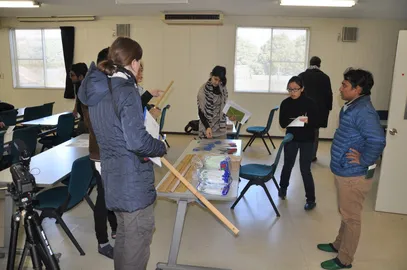Interviews with experts and evaluation of scientific publications indicate that expectations of bio-economic innovations are often too high.
May 20, 2020.
Is bio-economy a Holy Grail?
The term bio-economy is mentioned more frequently in political strategy papers. For example, Germany has a national bio-economy strategy that has just been revised. However, many countries in Europe, Africa, Asia and Latin America also see the bio-economy as the one solution to a variety of problems caused by an economy that is growing at the expense of nature. Dr. Lisa Biber-Freudenberger, senior researcher at the Center for Development Research (ZEF) at the University of Bonn, has interviewed 200 experts per online survey and evaluated specialist literature to investigate the extent to which the hope of the bio-economy as a "panacea" is justified. In addition, she researched what opportunities the concept of bio-economy offers as a development strategy in a global context and where the challenges lie.
But what is ‘bio-economy’ actually? There are different definitions circulating from international, national, academic, political governmental and non-governmental organizations. In short, bio-economy encompasses different sectors that rely on the use of biological organisms (animals and plants) and biological processes. These can be both the processing of biomass, e.g. for the production of bioenergy, and biological processes, e.g. in the case of bacteria that produce insulin or play a role in the production of bioplastics. Advocates of the development and patenting of such technologies and processes stress the opportunities for a sustainable economy. Politicians here as well as in the global South often hope that the bio-economy will provide the 'holy grail': economic development and increasing prosperity for all without negative effects on nature and the poorest people in the world.
What is the scientific perspective? Dr. Biber-Freudenberger emphasizes: "Not all bio-economies are the same. The opportunities and risks for sustainable development must always be considered on a case-by-case basis. However, our online survey of 200 experts and a comprehensive evaluation of scientific publications showed that expectations of bio-economic innovations are often - especially at the beginning – very high and have to be adjusted later on". Dr. Biber-Freudenberger believes that this is mainly due to the fact that the majority of innovations and their effects are initially tested in laboratories and in controlled environments only. However, if these are then implemented under real conditions and disseminated more widely, this often leads to negative side effects that were previously difficult to foresee. "Our study has shown that we can expect negative side-effects especially in the area of social impacts, e.g. in the area of gender equality. These cannot be investigated in laboratories beforehand and therefore the overall picture of a bio-economic innovation is initially better," explains Dr. Biber-Freudenberger.
This conclusion is also evident when looking at different bio-economic sectors: While the expectations for positive effects of bioenergy have decreased considerably over the last few years, biopharmaceuticals, for example, continue to be very popular. The study emphasizes that in the context of technology impact assessments, the opportunities and risks of bio-economic innovations for sustainable development must be critically analyzed. Interactions between supply and demand dynamics must be taken into account to ensure that bio-economic growth remains within ecological boundaries and aims at socially inclusive economic development. Only then can it be ensured that the bio-economy does not bring more harm than good.
Read the full article here: https://onlinelibrary.wiley.com/doi/10.1002/sd.2072
Further information at www.strive-bioecon.org,



